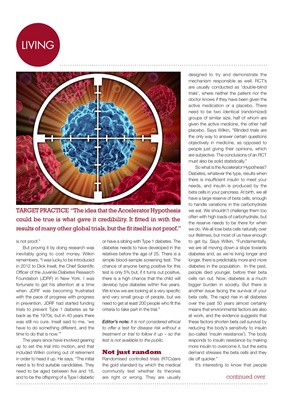
LIVINGLIVING
continued over
is not proof."
But proving it by doing research was
inevitably going to cost money. Wilkin
remembers, "I was lucky to be introduced
in 2012 to Dick Insell, the Chief Scientific
Officer of the Juvenile Diabetes Research
Foundation (JDRF) in New York. I was
fortunate to get his attention at a time
when JDRF was becoming frustrated
with the pace of progress with progress
in prevention. JDRF had started funding
trials to prevent Type 1 diabetes as far
back as the 1970s, but in 40 years there
was still no cure. Insell said to me, 'we
have to do something different, and the
time to do that is now.'"
The years since have involved gearing
up to set the trial into motion, and that
included Wilkin coming out of retirement
in order to head it up. He says, "The initial
need is to find suitable candidates. They
need to be aged between five and 16,
and to be the offspring of a Type I diabetic
or have a sibling with Type 1 diabetes. The
diabetes needs to have developed in the
relatives before the age of 25. There is a
simple blood-sample screening test. The
chance of anyone being positive for this
test is only 5% but, if it turns out positive,
there is a high chance that the child will
develop type diabetes within five years.
We know we are looking at a very specific
and very small group of people, but we
need to get at least 200 people who fit the
criteria to take part in the trial."
Editor's note: It is not considered ethical
to offer a test for disease risk without a
treatment or trial to follow it up - so the
test is not available to the public.
Not just random
Randomised controlled trials (RTCs)are
the gold standard by which the medical
community test whether its theories
are right or wrong. They are usually
designed to try and demonstrate the
mechanism responsible as well. RCT's
are usually conducted as 'double-blind
trials', where neither the patient nor the
doctor knows if they have been given the
active medication or a placebo. There
need to be two identical (randomized)
groups of similar size, half of whom are
given the active medicine, the other half
placebo. Says Wilkin, "Blinded trials are
the only way to answer certain questions
objectively in medicine, as opposed to
people just giving their opinions, which
are subjective. The conclusions of an RCT
must also be solid statistically."
So what is the Accelerator Hypothesis?
Diabetes, whatever the type, results when
there is insufficient insulin to meet your
needs, and insulin is produced by the
beta cells in your pancreas. At birth, we all
have a large reserve of beta cells, enough
to handle variations in the carbohydrate
we eat. We shouldn't challenge them too
often with high loads of carbohydrate, but
the reserve needs to be there for when
we do. We all lose beta cells naturally over
our lifetimes, but most of us have enough
to get by. Says Wilkin, "Fundamentally,
we are all moving down a slope towards
diabetes and, as we're living longer and
longer, there is predictably more and more
diabetes in the population. In the past,
people died younger, before their beta
cells ran out. Now, diabetes is a much
bigger burden in society. But there is
another issue facing the survival of your
beta cells. The rapid rise in all diabetes
over the past 50 years almost certainly
means that environmental factors are also
at work, and the evidence suggests that
these factors shorten beta cell survival by
reducing the body's sensitivity to insulin
(so-called 'insulin resistance'). The body
responds to insulin resistance by making
more insulin to overcome it, but the extra
demand stresses the beta cells and they
die off quicker."
It's interesting to know that people
TARGET PRACTICE: "The idea that the Accelerator Hypothesis
could be true is what gave it credibility. It fitted in with the
results of many other global trials, but the fit itself is not proof."